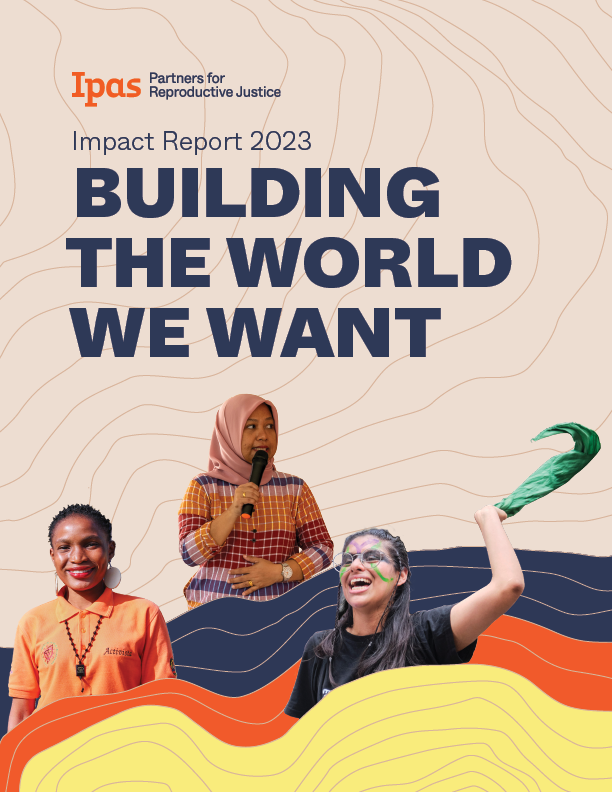Impact Report 2023:
Building the world we want
For over 50 years, Ipas has worked to ensure that reproductive health care, including abortion and contraception, are available and accessible to all. This report shares some of the key impacts of our work in 2023.
We helped health systems expand abortion access
access points supported by Ipas
1,853 access points supported for self-managed abortion with pills

At Ipas-supported health facilities:
people received abortion services across 25 countries
people received contraception
Martha Tadesse for Ipas
We built political support and leadership for abortion rights
policy changes to expand abortion access in 11 countries
public statements and commitments in support of abortion access in 20 countries
We reached millions across the world with information on reproductive health
In Bolivia, Nepal, Nigeria, Myanmar and South Africa, Ipas teams and trainees like peer educators, youth and volunteers reached 14,420 individuals with sexual and reproductive health and rights information, including on abortion.
Across Latin America and the Caribbean (LAC), 9,341,172 people were reached with information through Ipas LAC and Ipas Mexico Facebook pages and 1,854,724 through the Ipas LAC Instagram page.
In the Democratic Republic of Congo, Ipas teams reached 300,000 people through online campaigns; 1,335 participants in online webinars; and 16,513 new users joined the Nurse Nisa chatbot, which produced 13,856 messages on sexual and gender-based violence, 7,185 on abortion, and 3,607 on contraception.
Humanitarian response
We improved access to quality abortion care in crisis settings
Ipas Democratic Republic of Congo (DRC) is responding to a surge in violence and resulting displacement in eastern DRC with a mobile clinic initiative and community outreach to camps for those forced to flee their homes due to armed conflict. As a result, 987 victims of sexual violence received sexual and reproductive health care from providers at Ipas-supported access points. 15,716 heads of households, including 10,814 women and 4,398 men, participated in awareness-raising sessions on reproductive health topics, including access to safe abortion and the fight against gender-based violence in the camps.
Ipas Bangladesh is addressing sexual and gender-based violence among forcibly displaced Myanmar nationals in both Cox’s Bazar and Bhasan Char. Providers trained by Ipas and partners are now offering sexual and gender-based violence services across 47 access points, along with as-needed referrals to partner NGOs offering psychological, legal, and shelter support. Between July 2022 and June 2023, Ipas supported 51 humanitarian health facilities provided 8,066 abortion and postabortion care services, and over one million family planning services.
After floods devastated rural Pakistan in 2022, Ipas Pakistan collaborated with the government and local partners to develop a local response plan. In Sindh province, we trained 55 doctors and midwives, and procured and distributed 500 self-care kits with hygiene and protection items, including information on self-managed abortion and contraception, in flood-affected areas.
Climate Justice
Our research is paving the way for women-led climate justice
Ipas Ethiopia generated evidence on the impact of drought on sexual and gender-based violence incidence, service, and responses in Ethiopia. Our findings show significant barriers to care for survivors because sexual and gender-based violence was not seen as a priority by humanitarian stakeholders—or even by survivors themselves, who were focused on basic necessities like food. From this work, Ipas organized one national and three regional dissemination and advocacy workshops about the intersectionality of climate change, gender, and reproductive justice.
Ipas Africa Alliance conducted a research study on access and provision of comprehensive sexual and reproductive health care to communities experiencing climate change-induced extreme weather in arid- and semi-arid lands in Northern Kenya. Based on in-depth interviews with women and girls, Maasai warriors, health system experts and community group leaders, the final results will inform climate action that integrates sexual and reproductive health and rights to bolster the resilience of these communities and health systems.
Ipas Bolivia conducted research to explore the effects of climate change on sexual and reproductive health in adult women, young women, and indigenous girls in rural communities (Altiplano, Amazon, Chaco, and Valles). From 32 in-depth interviews, 16 key informant interviews and multiple focus groups with adults and adolescents, the study found that climate change affects the poorest families, increasing teenage marriages to alleviate the pressing shortage of economic resources and reinforcing women’s economic dependence.
Gender-based violence
We improved care for survivors of sexual and gender-based violence
Ipas Bangladesh focused a project to address sexual and gender-based violence (SGBV) and reproductive coercion faced by women and girls in low socioeconomic conditions in urban areas. Latest records show that 4,870 community members attended SGBV awareness sessions, 172 doctors and 107 mid-level providers were trained on SGBV and 650 community-based youth volunteers received basic training on SGBV. A total of 1,060 SGBV cases have been reported, addressed, and recorded in the reporting period, showing a significant increase from before Ipas’s project.
Ipas Indonesia helped make improvements to the penal code to expand abortion as part of comprehensive services for victims of sexual violence. Thanks to efforts by Ipas Indonesia and local partners working on criminal justice reform, Indonesia has improved the penal code:
- It is more explicit about the exception in providing access to abortion (Article 463 (2)).
- It expanded the scope of abortion not only for rape victims but also for any unwanted pregnancy resulting from sexual violence (Article 463 (2)).
- The gestational age for abortion was increased for unwanted pregnancy resulting from rape or other sexual violence to 14 weeks (Article 463 (2)).
- Protection from criminalization is included for health professionals (medical doctors, midwives, paramedics, pharmacists) who perform abortions. (Article 465 (3))
Reaching marginalized communities
We helped more people access sexual and reproductive health and rights
Disability inclusion:
- Ipas Ethiopia partnered with the Ethiopian Women with Disabilities National Association to provide intersectional sexual and reproductive health and rights (SRHR) training to 3,125 young women with disabilities, created a sharing platform for 26 people with disabilities and health service providers to raise awareness about the sexual and reproductive care needs of those with disabilities, and trained 46 family members of children with intellectual disabilities on sexual and reproductive health and rights and available services.
- Ipas Nigeria Health Foundation collaborated with the Deaf Women Association of Nigeria to co-create interventions to reduce stigma expressed by health providers and strengthen pathways for deaf women to access modern contraception. Ipas Nigeria helped provide 105 women with disabilities with contraceptive information and sensitize 35 health providers and 27 traditional leaders on disability rights and SRHR.
LGBTQ+ inclusion:
- Ipas Democractic Republic of Congo (DRC) built a strong partnership with Si Jeunesse Savait, a community-based organization that holds LGBTQ+ inclusion in sexual and reproductive health as a pillar of its work. Ipas DRC strengthened the organization’s operational and financial capacities, equipping it to provide activities for the LGBTQ+ community on sexual and reproductive health and rights issues.
- Ipas Bolivia worked closely with LGBTQ+ organizations on two strategic actions: a) Promoting national compliance with international recommendations that guarantee the rights of the LGBTQ+ population and b) supporting self-managed abortion among the LGBTQ+ population. Our goal is the creation of an autonomous support network for LGBTQ+ individuals who pursue self-managed abortion, which will preserve this population’s confidentiality and meet their specific needs.


